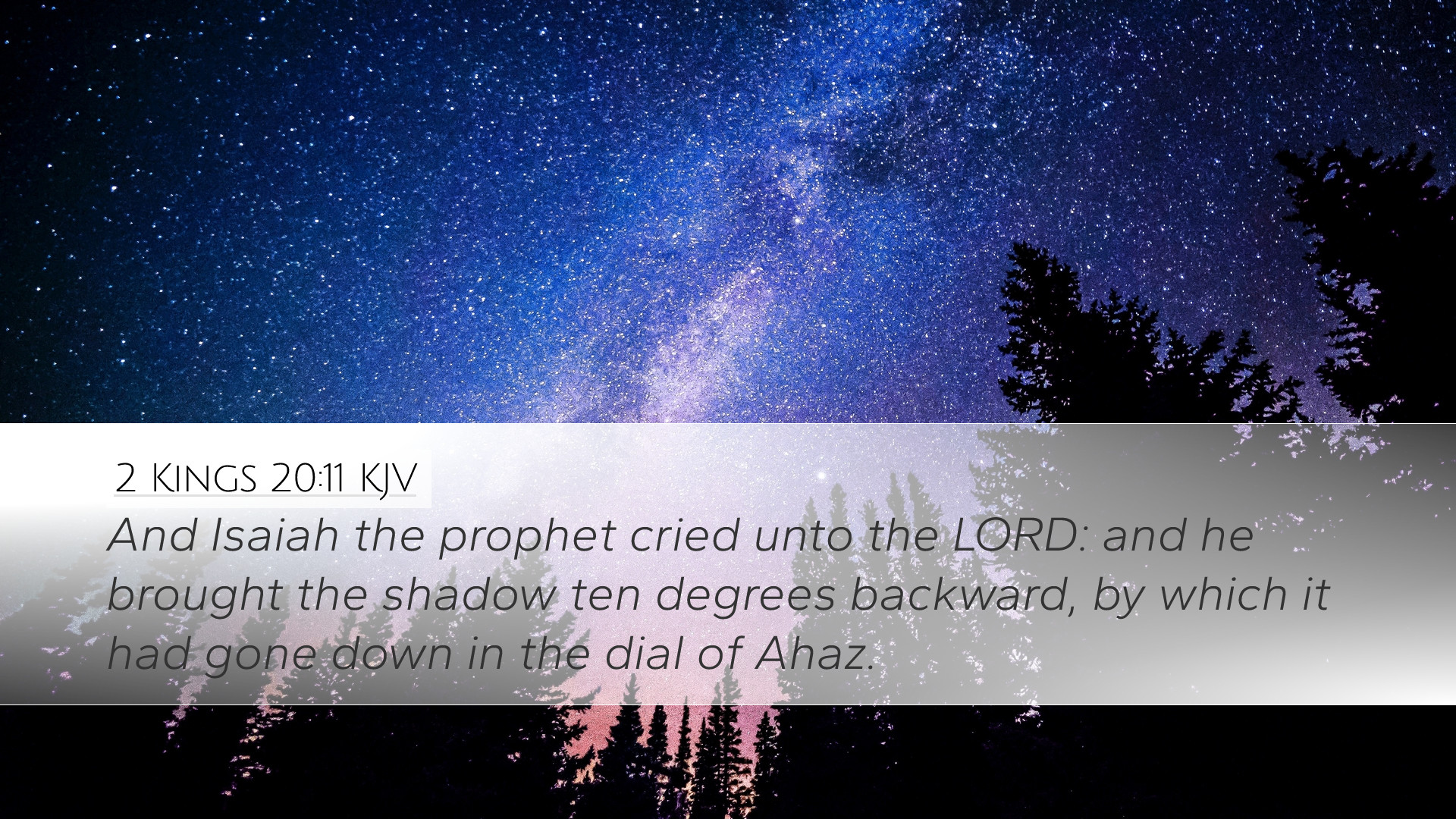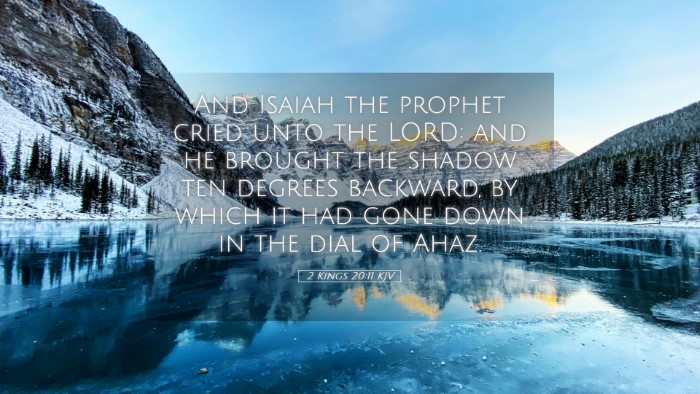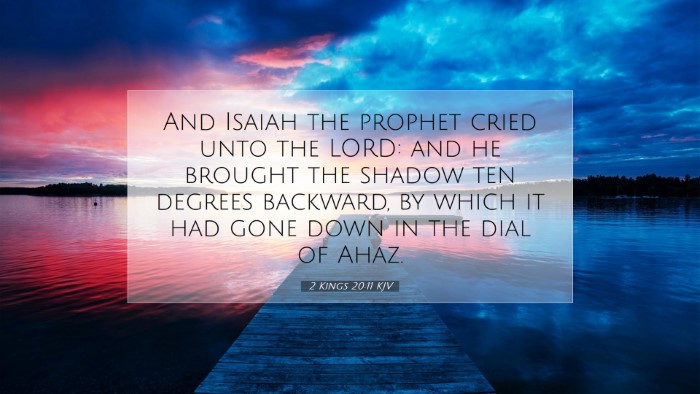Old Testament
Genesis Exodus Leviticus Numbers Deuteronomy Joshua Judges Ruth 1 Samuel 2 Samuel 1 Kings 2 Kings 1 Chronicles 2 Chronicles Ezra Nehemiah Esther Job Psalms Proverbs Ecclesiastes Song of Solomon Isaiah Jeremiah Lamentations Ezekiel Daniel Hosea Joel Amos Obadiah Jonah Micah Nahum Habakkuk Zephaniah Haggai Zechariah Malachi2 Kings 20:11
2 Kings 20:11 KJV
And Isaiah the prophet cried unto the LORD: and he brought the shadow ten degrees backward, by which it had gone down in the dial of Ahaz.
2 Kings 20:11 Bible Commentary
Commentary on 2 Kings 20:11
Verse: “And Isaiah the prophet cried unto the Lord: and he brought the shadow ten degrees backward, by which it had gone down in the dial of Ahaz.”
Introduction
This significant event in 2 Kings 20:11 marks a profound moment in the life of King Hezekiah and illustrates the power of prayer, prophetic ministry, and divine intervention. The verse captures the essence of Isaiah’s prophetic role and the extraordinary signs performed by God, emphasizing both His sovereignty and His concern for His faithful followers.
Historical Context
Hezekiah was one of the kings of Judah noted for his attempts to reform the nation by restoring proper worship of Yahweh. However, he faced dire circumstances, including illness and threats from foreign powers.
This verse comes after God had relieved Hezekiah of his sickness and granted him an extension of life as well as reaffirmation of His covenant with Israel. The miraculous sign of the shadow moving backward served not only as confirmation of God’s promise but also as a public display of His might.
Insights from Commentators
-
Matthew Henry:
Henry emphasizes the importance of prayer in the life of Hezekiah. The significance of Isaiah praying to God on behalf of the king illustrates the intercessory aspect of prophetic ministry. He notes that the backward movement of the shadow serves as an illustration of God's power over nature – something a mere man could not achieve. He highlights that this act provided visible evidence of God’s promise and brought encouragement to the king.
-
Albert Barnes:
Barnes points out that the miracle demonstrated God's control over time and the natural order. He notes the dial of Ahaz, possibly a sun-dial, and how the adjustment by ten degrees was no trivial matter. This miraculous sign not only served as a reassurance to Hezekiah but also as a testimony to others concerning God’s existence and sovereignty. Such a display encourages believers to trust in God, even in impossible situations.
-
Adam Clarke:
Clarke delves into the technical aspects of the miracle, proposing that the shadow's return may have been perceived differently by those witnessing it. He explains that the reversal of the shadow could symbolize the reversal of Hezekiah’s fate. Clarke also notes the precedent of God performing signs in accord with His promises, thereby reinforcing the faith of His people and encouraging the faithful to rely on divine intervention.
Theological Themes
This verse encapsulates several important theological themes:
- Divine Providence: The narrative reveals God’s intimate involvement in the affairs of His people. Through Isaiah’s prayer, God modifies the natural order, demonstrating His sovereignty and providential care.
- Faith and Assurance: The miracle serves to bolster Hezekiah’s faith amid fear and uncertainty. The king’s request for a sign reveals his human desire for visible proof, which God graciously provides.
- The Role of Prophecy: Isaiah serves as a vital link between God and His people, affirming the essential function of prophetic voices in guiding, warning, and encouraging God’s followers.
Application for Today
For pastors, students, and theologians, this verse provides rich material for reflection on the nature of faith and the workings of God in our lives. The text encourages believers to approach God in prayer with their petitions, trusting in His ability to intervene in seemingly impossible situations.
Furthermore, it emphasizes the need to recognize and appreciate God’s signs and wonders in our own lives while also reinforcing the importance of prophetic voices and faithful leaders who intercede on behalf of the community.
Conclusion
In summary, 2 Kings 20:11 serves as a profound reminder of God’s sovereignty, the power of prayer, and the nature of prophetic ministry. By examining insights from esteemed biblical commentators like Matthew Henry, Albert Barnes, and Adam Clarke, we gain a deeper understanding of this passage, urging us to trust in God’s plans while seeking His guidance in our lives. This account assures us that God is ever-present, willing to respond to our cries, and capable of extraordinary works that reaffirm His promises.


